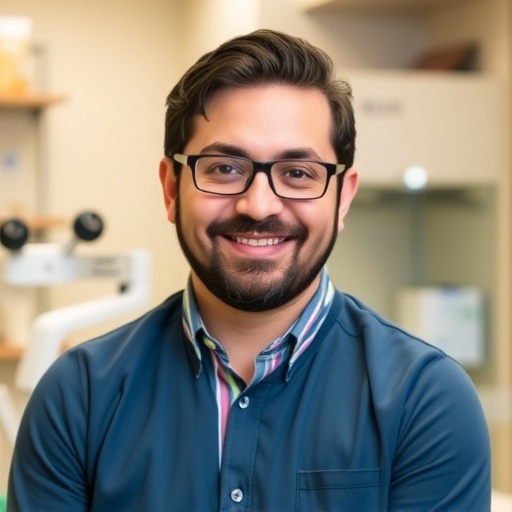In a groundbreaking research endeavor poised to revolutionize cancer treatment, a multidisciplinary team led by Dr. Michele Ardolino of the University of Ottawa is embarking on an ambitious project funded by a prestigious $3 million grant from the Terry Fox Research Institute. This initiative aims to unravel the intricate crosstalk between the immune system, nervous system, and gut microbiome—collectively known as the neuro-immune-gut axis—and its critical role in modulating anti-cancer immunity. Immunotherapy, which harnesses the body’s own defenses to combat cancer, has yielded remarkable outcomes for some patients but disappointingly falls short for many others. Dr. Ardolino’s team seeks to dissect these disparities by adopting a holistic, integrated approach that transcends traditional boundaries of biomedical research.
Immunotherapies have ushered in a new era of oncology, yet their effectiveness remains highly variable. Despite significant investments, the proportion of patients who attain durable responses to treatments like immune checkpoint inhibitors remains limited. Recognizing this fundamental challenge, Dr. Ardolino proposes that conventional investigations often overlook the subtle yet profound interplay between the nervous system, microbiota, and immune cells. By delving into this complex triad collectively, the team hypothesizes it will be possible to identify key mechanisms suppressing immune functionality within the tumoral microenvironment, which, when targeted, could unleash the full therapeutic potential of immunotherapies.
The innovative premise of this research rests on the concept of systems biology, where the patient is viewed as an integrated whole rather than a sum of isolated parts. Dr. Ardolino emphasizes, “Only by examining communication pathways from the brain through the gut to circulating immune cells can we tailor personalized therapies that maximize efficacy.” This concept challenges traditional compartmentalized approaches and acknowledges the multifactorial nature of cancer pathogenesis and immune resistance. The team is particularly interested in “unconventional players,” including neural signaling circuits and microbial metabolites that may modulate immune cell activity, as potential gatekeepers of treatment success or failure.
Central to their investigation is the role of Natural Killer (NK) cells—a specialized subset of immune cells with potent cytotoxic capacity against tumors. Previous studies by members of the collaborative group have highlighted that certain biological stimuli can sensitize resistant tumors to immune-mediated elimination. By deciphering how neurological and microbial factors hinder NK cell function, this research aims to restore their anti-tumor activity, thereby enhancing patient responsiveness to immunotherapies. This integrative approach could foster novel therapeutic interventions that combine immunomodulation with microbiome and neurobiological strategies.
The team’s composition is a testament to the project’s interdisciplinary ambition. It assembles top-tier Canadian scientists, including Dr. Sebastien Talbot from Queen’s University and Drs. Nicolas Jacquelot and Kathy McCoy from the University of Calgary, alongside Drs. Barbara Vanderhyden and David Cook of the University of Ottawa Faculty of Medicine and The Ottawa Hospital’s Research Institute. This collective expertise spans immunology, neurobiology, microbiology, cancer biology, and computational modeling, empowering the project to leverage cutting-edge technologies and large-scale analytical platforms.
A critical asset for achieving their bold objectives is the access to state-of-the-art animal models and specialized experimental tools developed by the team. These unique mouse models are engineered to dissect cell-specific interactions and molecular pathways within the neuro-immune-gut axis, enabling precise manipulation and observation of system-wide effects on tumor immunity. Complemented by advanced imaging, genomics, and metabolomic assays, these models provide an unparalleled window into the dynamic inter-organ communications shaping therapeutic outcomes.
Dr. Ardolino envisions a future where insights from this research will delineate the mechanistic basis of immunotherapy resistance in exquisite detail. “Our goal is to identify how tumors evade immune attack by misdirecting nerve signals or fostering a dysbiotic gut environment, then devise strategies to counteract these mechanisms,” she says. This knowledge will not only deepen fundamental understanding but also inform clinical translation, potentially leading to novel combination therapies that harness the full spectrum of biological interactions influencing cancer progression.
Crucially, patient engagement has been integral to the design and direction of this project. By incorporating the perspectives of patient partners, the research prioritizes clinical relevance and translational potential. This participatory approach ensures that the scientific questions addressed resonate with patient experiences and unmet needs, accelerating the path from bench to bedside. It exemplifies a modern, inclusive research ethos that values stakeholder collaboration as a catalyst for impactful discovery.
The proposed investigation transcends academic curiosity; it tackles one of oncology’s most vexing challenges: the heterogeneity of immunotherapeutic response. It acknowledges that cancer is not merely a cellular anomaly but a systemic disorder involving complex interdependencies across multiple physiological domains. By embracing this complexity, Dr. Ardolino’s team is poised to rewrite the paradigms of cancer immunology and therapeutic design, striving towards a future where personalized, integrated treatment regimens dramatically improve patient survival and quality of life.
This work holds promise not only within the realm of cancer but also offers broader implications for understanding interactions between the nervous, immune systems, and microbiome in human health and disease. Insights gleaned here may illuminate pathophysiological mechanisms in autoimmune disorders, neurodegenerative diseases, and metabolic syndromes where similar inter-systemic dysregulation occurs. Hence, the ripple effects of this research may extend well beyond oncology, influencing diverse biomedical fields.
As the team embarks on this cutting-edge journey, they underscore the need for sustained collaborative effort and innovation. The integration of diverse expertise, technological prowess, and patient-centered vision represents a formidable paradigm for contemporary biomedical research. With support from the Terry Fox Research Institute, these scientists are positioned to yield transformative discoveries that could redefine cancer treatment landscapes globally, embodying hope for millions confronting this devastating disease.
Subject of Research: Cells
Article Title: Not provided
News Publication Date: Not provided
Web References:
– https://www.tfri.ca/our-research/research-project/neuro-innate-gut-axis-control-of-anti-cancer-immunity?utm_source=sfmc&utm_medium=email&utm_campaign=October+29%2c+25+-+PPG+Announcement&utm_term=Dr.+Michelle+Ardolino&utm_id=56298
– https://www.uottawa.ca/faculty-medicine/dr-michele-ardolino
Image Credits: Faculty of Medicine, University of Ottawa
Keywords: Immunotherapy, Cancer, Cancer immunology, Gut microbiota, Immune cells, Nervous system, Cancer treatments, Microbiology, Biochemistry, Immunology, Mouse models, Health care delivery




